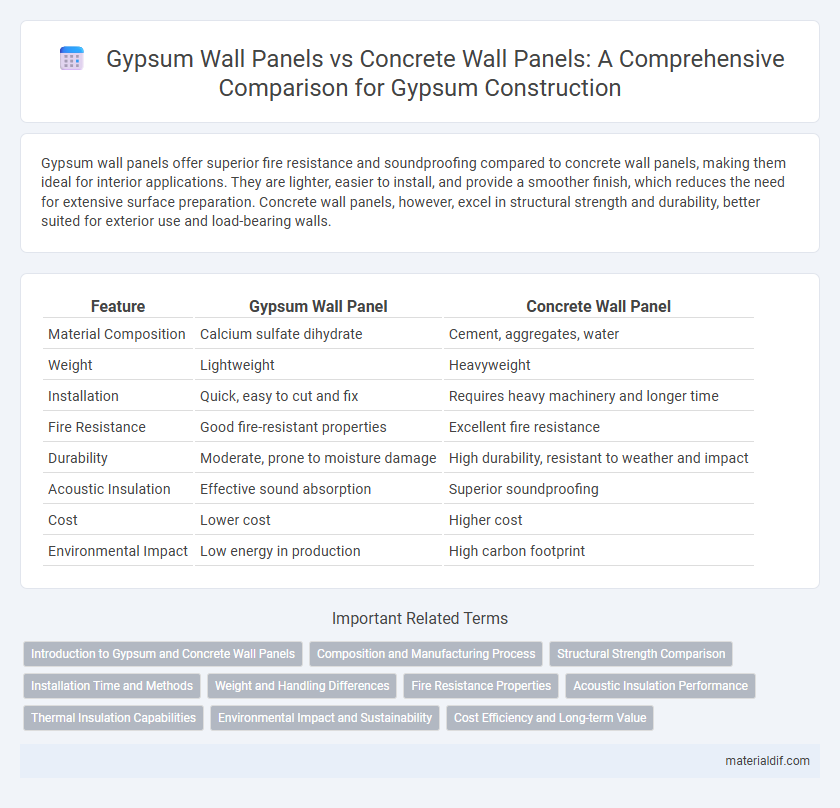Gypsum wall panels offer superior fire resistance and soundproofing compared to concrete wall panels, making them ideal for interior applications. They are lighter, easier to install, and provide a smoother finish, which reduces the need for extensive surface preparation. Concrete wall panels, however, excel in structural strength and durability, better suited for exterior use and load-bearing walls.
Table of Comparison
| Feature | Gypsum Wall Panel | Concrete Wall Panel |
|---|---|---|
| Material Composition | Calcium sulfate dihydrate | Cement, aggregates, water |
| Weight | Lightweight | Heavyweight |
| Installation | Quick, easy to cut and fix | Requires heavy machinery and longer time |
| Fire Resistance | Good fire-resistant properties | Excellent fire resistance |
| Durability | Moderate, prone to moisture damage | High durability, resistant to weather and impact |
| Acoustic Insulation | Effective sound absorption | Superior soundproofing |
| Cost | Lower cost | Higher cost |
| Environmental Impact | Low energy in production | High carbon footprint |
Introduction to Gypsum and Concrete Wall Panels
Gypsum wall panels are lightweight, fire-resistant, and provide excellent sound insulation, commonly used in interior partitions and ceilings. Concrete wall panels offer high durability, structural strength, and thermal mass, making them ideal for exterior walls and load-bearing applications. Both materials serve distinct construction needs, with gypsum panels prioritizing ease of installation and finish quality while concrete panels emphasize strength and longevity.
Composition and Manufacturing Process
Gypsum wall panels consist primarily of calcium sulfate dihydrate (CaSO4*2H2O) mixed with additives like paper facings and fiberglass for reinforcement, produced through a hydration and setting process using raw gypsum plaster. In contrast, concrete wall panels are composed of cement, aggregates (sand, gravel), water, and chemical admixtures, manufactured by mixing these ingredients and curing them in molds through a hydration process resulting in a hardened composite. The gypsum panel manufacturing emphasizes rapid drying and smooth finishes, while concrete panels require extended curing times for structural strength and durability.
Structural Strength Comparison
Gypsum wall panels exhibit lower structural strength compared to concrete wall panels, making them less suitable for load-bearing applications. Concrete panels provide higher compressive and tensile strength, enhancing durability and resistance to environmental stresses. The density and composition differences significantly influence the overall stability and impact resistance of these wall systems.
Installation Time and Methods
Gypsum wall panels offer significantly faster installation times compared to concrete wall panels due to their lightweight nature and ease of handling, allowing for quick cutting and mounting with standard tools. Installation of gypsum panels typically involves simple fastening to metal or wood studs using screws, followed by taping and finishing joints, which accelerates project completion. In contrast, concrete wall panels require heavy machinery for placement and curing time, making their installation process more labor-intensive and time-consuming.
Weight and Handling Differences
Gypsum wall panels are significantly lighter than concrete wall panels, typically weighing around 9 to 12 pounds per square foot compared to concrete panels that can exceed 30 pounds per square foot. This substantial weight difference makes gypsum panels easier to handle, transport, and install, reducing labor costs and installation time. The lighter weight also minimizes structural load on buildings, making gypsum panels preferable for interior partitions and renovations.
Fire Resistance Properties
Gypsum wall panels exhibit superior fire resistance due to their calcium sulfate dihydrate content, which releases water vapor when exposed to heat, slowing fire spread and protecting structural elements. In contrast, concrete wall panels provide inherent fire resistance through their dense, non-combustible composition but can suffer spalling under extreme heat, compromising integrity. Gypsum panels also offer faster fire rating certifications and easier installation, making them preferable for building codes emphasizing fire safety performance.
Acoustic Insulation Performance
Gypsum wall panels offer superior acoustic insulation compared to concrete wall panels due to their porous structure and sound-absorbing properties, which effectively reduce airborne noise transmission. Concrete wall panels, while denser and heavier, tend to reflect sound waves, resulting in less effective sound dampening. For environments requiring enhanced soundproofing, such as recording studios or office spaces, gypsum panels provide a more efficient solution in managing noise levels.
Thermal Insulation Capabilities
Gypsum wall panels offer superior thermal insulation compared to concrete wall panels due to their lower thermal conductivity, typically around 0.17-0.21 W/m*K, which helps maintain indoor temperature stability and reduces energy consumption for heating and cooling. Concrete wall panels, with thermal conductivity values ranging from 1.4 to 2.0 W/m*K, conduct heat more readily, leading to less efficient insulation. The lightweight composition and porous structure of gypsum contribute to its enhanced thermal performance, making it a preferred choice in energy-efficient building designs.
Environmental Impact and Sustainability
Gypsum wall panels have a lower environmental impact compared to concrete wall panels due to their reduced carbon footprint and greater recyclability. The production of gypsum panels consumes less energy and emits fewer greenhouse gases than concrete manufacturing, promoting sustainability. Gypsum panels also contribute to improved indoor air quality through moisture regulation and resistance to mold growth, enhancing overall environmental performance.
Cost Efficiency and Long-term Value
Gypsum wall panels offer superior cost efficiency due to lower material and installation costs compared to concrete wall panels. Their lightweight nature reduces labor expenses and shortens construction timelines, enhancing overall project budget management. Over the long term, gypsum panels provide excellent value with easy maintenance and effective fire resistance, while concrete panels demand higher initial investment but deliver greater durability and thermal mass benefits.
Gypsum wall panel vs Concrete wall panel Infographic

 materialdif.com
materialdif.com